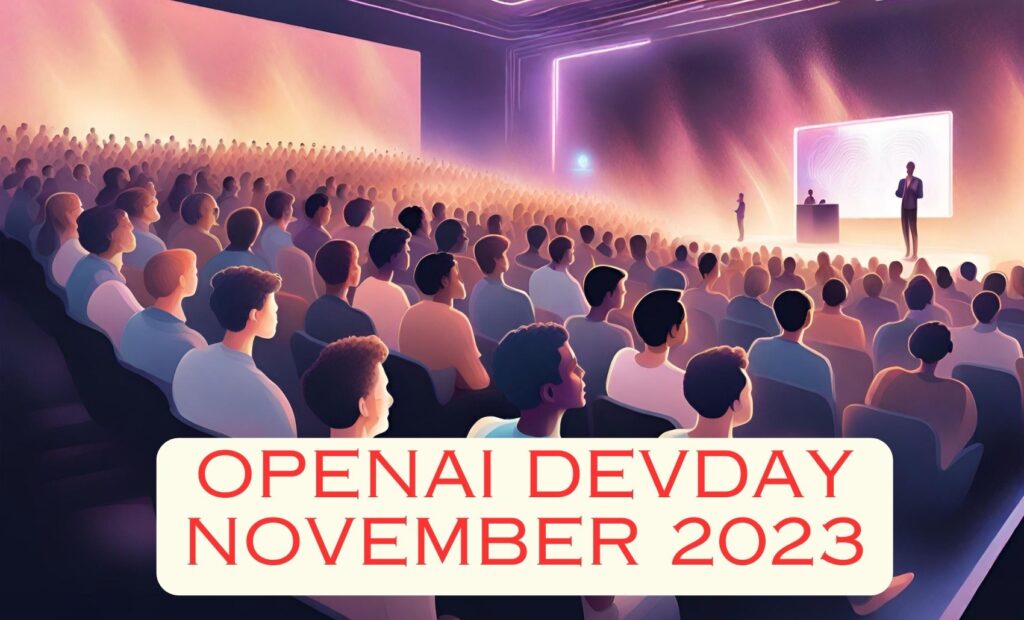OpenAI DevDay Key Announcements and Updates:
Sam Altman delivered the opening keynote at OpenAI DevDay in San Francisco.

Past Year Achievements:
- Launched ChatGPT and GPT-4, with voice and vision capabilities added to ChatGPT.
- Released DALL-E 3, an advanced image model.
- Introduced ChatGPT Enterprise with enhanced security, privacy, faster GPT-4 access, and longer context windows.
- Currently, OpenAI serves 2 million developers, over 92% of Fortune 500 companies, and approximately 100 million weekly active users on ChatGPT.
- Growth achieved entirely through word of mouth.
User Testimonials:
Users have found creative and practical applications for ChatGPT, such as language translation, academic support, coding assistance, and aid for those with disabilities.
GPT-4 Turbo Launch:
GPT-4 Turbo, a new model with enhancements addressing developer feedback, including extended context length, more control over responses, better world knowledge, new modalities, and customization options.
Context Length: Supports up to 128,000 tokens (16 times the 8K context), equating to roughly 300 standard book pages.
Control Over Responses: Introducing JSON Mode for valid JSON responses, improved function calling, reproducible outputs with a seed parameter, and logprobs visibility.
World Knowledge Updates:
GPT-4 Turbo updated with knowledge up to April 2023.
New retrieval feature to incorporate external knowledge into applications.
New Modalities and API Integrations:
Integration of DALL-E 3, GPT-4 Turbo with vision, and a new text-to-speech model into the API.
Launch of Whisper V3, an open-source speech recognition model.
Customization and Fine-tuning:
Fine-tuning of GPT-3.5 models and an experimental access program for GPT-4 fine-tuning.
Introduction of Custom Models, where OpenAI researchers help businesses create tailored models.
Increased Rate Limits and Customer Support:
Doubling tokens per minute for established GPT-4 customers and allowing direct requests for rate limit changes.
Introduction of copyright shield to protect customers from legal copyright claims.
OpenAI is committed to continuous improvement based on developer feedback and is launching several features and tools to assist developers and enterprises in leveraging their AI models more effectively.
GPT-4 Turbo Introduction and Price Reduction:
GPT-4 Turbo is announced as a significantly cheaper model than GPT-4, boasting improvements over the latter.
The cost is decreased by a factor of 3x for prompt tokens and 2x for completion tokens.
New pricing is set at 1¢ per 1,000 prompt tokens and 3¢ per 1,000 completion tokens, resulting in a more than 2.75 times cost reduction for most customers compared to GPT-4.
Future improvements to include increased speed.
Improvements on GPT-3.5 Turbo:
Cost reductions in input and output tokens, with GPT-3.5 Turbo 16K being less expensive than the previous GPT-3.5 4K model.
Keynote Presentation and Microsoft Partnership:
Special Guest Appearance:
Satya Nadella, CEO of Microsoft, joined the stage to discuss the partnership between OpenAI and Microsoft.
Microsoft’s Outlook on the Partnership:
- Microsoft is adapting its Azure infrastructure to support the unique demands of synchronous, large, data-parallel workloads associated with AI model training.
- The company’s goal is to provide the best systems for AI model builders and developers.
- Microsoft has integrated OpenAI APIs into its own developer products, such as GitHub Copilot.
- It offers the GitHub Copilot Enterprise edition to conference attendees.
Vision for the Future:
- Microsoft is dedicated to ensuring that infrastructure keeps pace with AI advancements.
- Both OpenAI and Microsoft share a mission centered on empowerment through AI and take safety considerations seriously.
ChatGPT Enhancements & GPTs Introduction:
ChatGPT now utilizes GPT-4 Turbo, which includes the latest improvements and knowledge.
The model picker feature has been removed, streamlining the user experience.
Launch of GPTs:
🚀 GPTs, customizable ChatGPT versions with expanded knowledge and capabilities, have been introduced to enhance user experience by allowing users to accomplish diverse tasks or enjoy more interactive fun.
GPTs are specialized versions of ChatGPT designed for specific purposes, combining instructions, expanded knowledge, and actions.
Users can build, customize, and publish GPTs for various tasks or entertainment needs.
Examples of GPT applications include an educational tool by Code.org for teachers and a design tool by Canva for creating posters through natural language commands.
GPT Live Demonstration by Jessica Shieh
Jessica Shieh‘s Role: Solutions Architect at OpenAI.
Jessica demonstrated a GPT that can interact with over 6,000 applications, enabling various integrations.
The demo showed how the technology is securely connected to personal applications such as calendars and can identify scheduling conflicts, with user permission required before taking any actions.
An example of use was provided, where the GPT was instructed to inform an individual named Sam that Jessica had to leave early.
GPT Creation and Customization by Sam
Sam introduces the concept of GPTs 🤖, which are shareable and customizable versions of ChatGPT tailored to individual or enterprise use, with a forthcoming GPT store feature.
He detailed the process of building a GPT that can assist founders and developers with advice on new projects.
The GPT creation does not require coding knowledge and can be built using conversational instructions.
Sam used a GPT builder tool to set up a “Startup Mentor” GPT, designed to provide founders with advice and ask critical questions about their business strategy.
He showcased how GPTs could utilize transcripts of lectures for advice generation and emphasized the user-friendly nature of the GPT builder interface.
Sam also demonstrated how to upload content to the GPT, tailor its capabilities, and gave examples of how it can be tested with questions relevant to startups.
GPT Store and Revenue Sharing
The upcoming GPT store will allow developers to share their GPTs either privately or publicly.
Users can publish GPTs and earn revenue based on the utility and popularity of their GPT.
💰 OpenAI plans to implement a revenue-sharing model for the most useful and popular GPTs, aiming to stimulate the development of a dynamic ecosystem around their GPT store.
APIs and Assistants on OpenAI DevDay
🛠️ The launch of the Assistants API makes building customized agent-like experiences easier by reducing the engineering complexity and time required for implementation.
Shopify’s Sidekick, Discord’s Clyde, and Snaps My AI were cited as examples of agent-like experiences built using APIs.
The new Assistants API facilitates the creation of assistive agents with features such as persistent threads, code interpretation, and improved functional calls.
Romain, Head of Developer Experience, demonstrated the integration of the new API modalities.
He showcased a travel app example with an integrated assistant that was built using just a few lines of code.
Romain highlighted the function calling feature of the API and its enhancements including guaranteed JSON output and support for multiple simultaneous function calls.
Demo by Romain with the Assistants API
Demonstrated the ease of creating an assistant and integrating it with an app.
Highlighted the creation of threads and messages for user interactions with the assistant.
Introduced new functionalities of the API, such as the ability to call functions in a more powerful and streamlined manner.
New Assistive API Features and Demonstrations
- Assistants can execute functions, such as annotating maps in real-time with pin drops based on user queries for top activities in a location.
- Retrieval feature allows the assistant to read and comprehend uploaded documents, like showing details from a PDF of a United Flight ticket, expediting the information extraction process.
- Stateful API eliminates the need to manage context and history, as the assistant manages the entire conversation state using the API, reducing developer workload and complexity.
- Developer dashboard transparency enables developers to see the steps and functions being executed within their tools, fostering better understanding and control.
Code Interpreter Capability
- Now available in the API, this allows the AI to write and execute code to solve user queries, such as calculating trip expenses when splitting costs among friends and converting currency.
- Potentially helpful for complex apps requiring extensive calculations or data analysis.
Assistants with Voice Interaction Examples
- A custom assistant is demonstrated, showing the potential of voice interaction with a simple Swift app using a collection of rich voices that support multiple languages.
- Demonstrated the assistant’s ability to perform tasks like selecting DevDay event attendees to receive OpenAI credits through a random draw. 🤑
Recap and Future of AI Agents
- The new capabilities of the Assistants API are designed to create more powerful, stateful, and interactive user experiences, integrating actions, retrieval, and the new Code Interpreter.
- Movement towards AI agents that can plan and perform complex actions on behalf of users.
- OpenAI emphasizes the importance of feedback-driven, iterative improvements to their systems.
- OpenAI’s roadmap contemplates gradually increasing the capabilities of AI assistants.
Partnerships and Technological Impact
- Deepened partnership with Microsoft to enhance AI technologies and their integration.
- Recognition of the hard work and talent at OpenAI necessary to bring these developments to reality.
- AI is perceived as a revolution for technological and societal advancement, offering individual empowerment and unprecedented creative potential.
- Anticipation for future technologies that will make current achievements appear limited in comparison, with a call to action for the community to be a part of this transformative journey.




